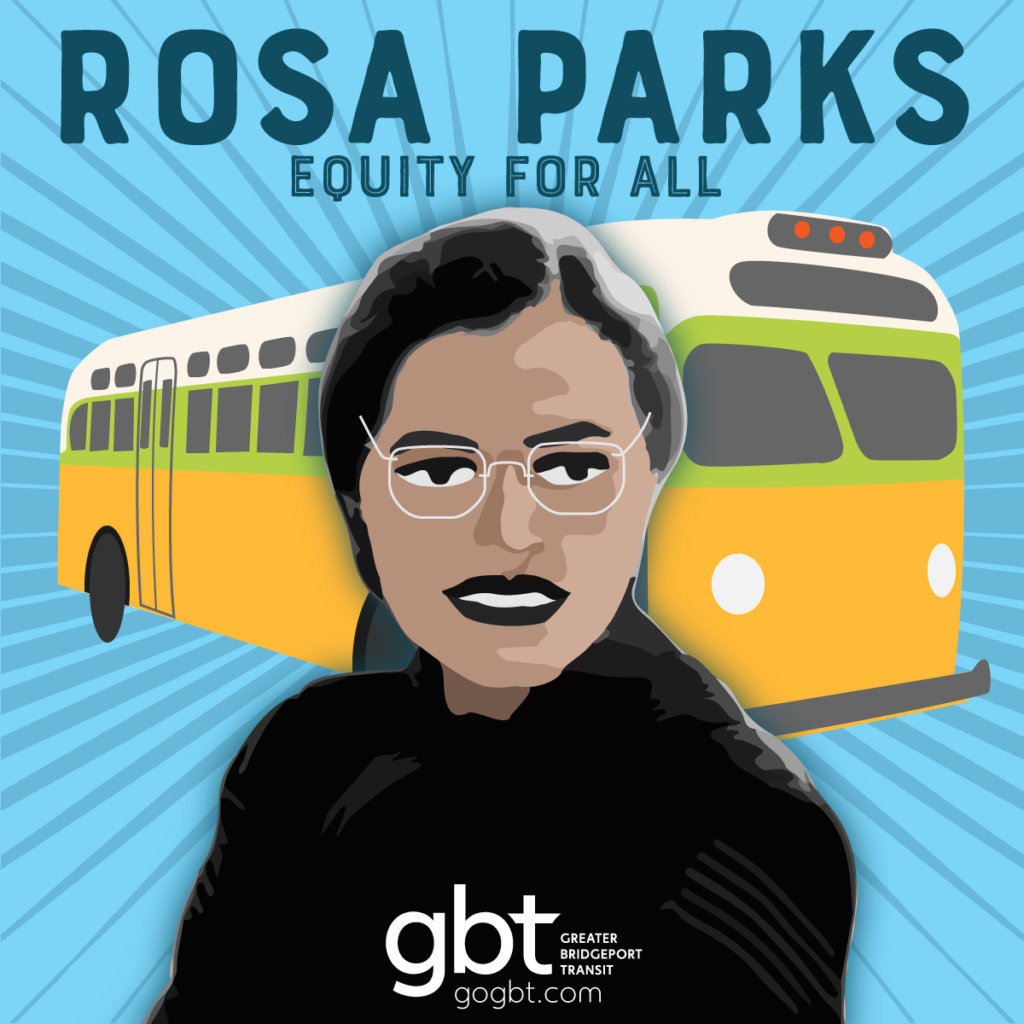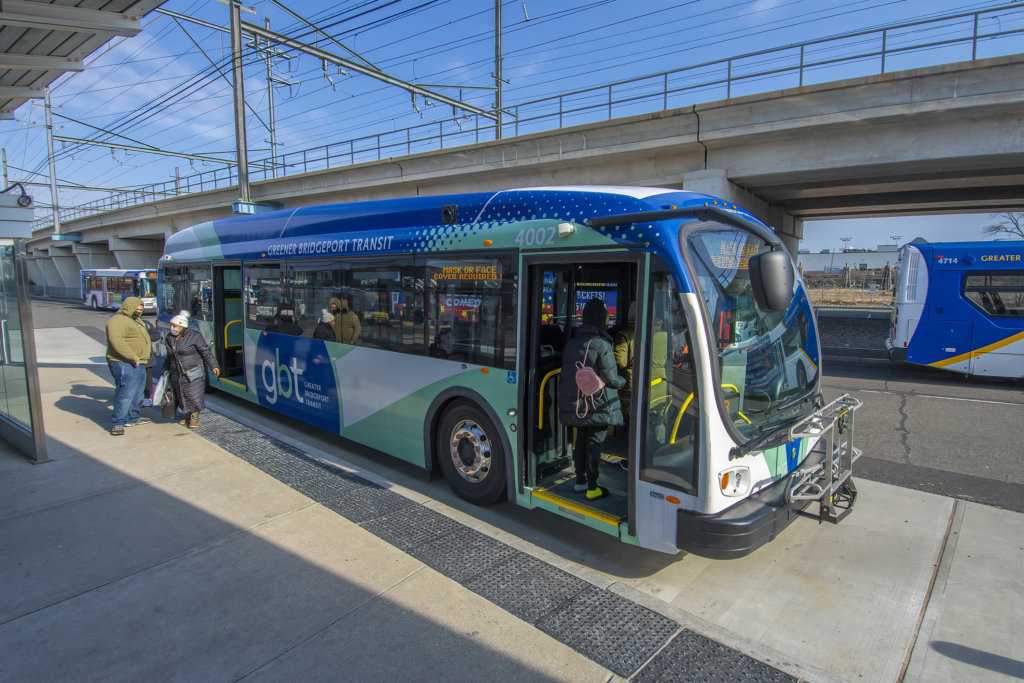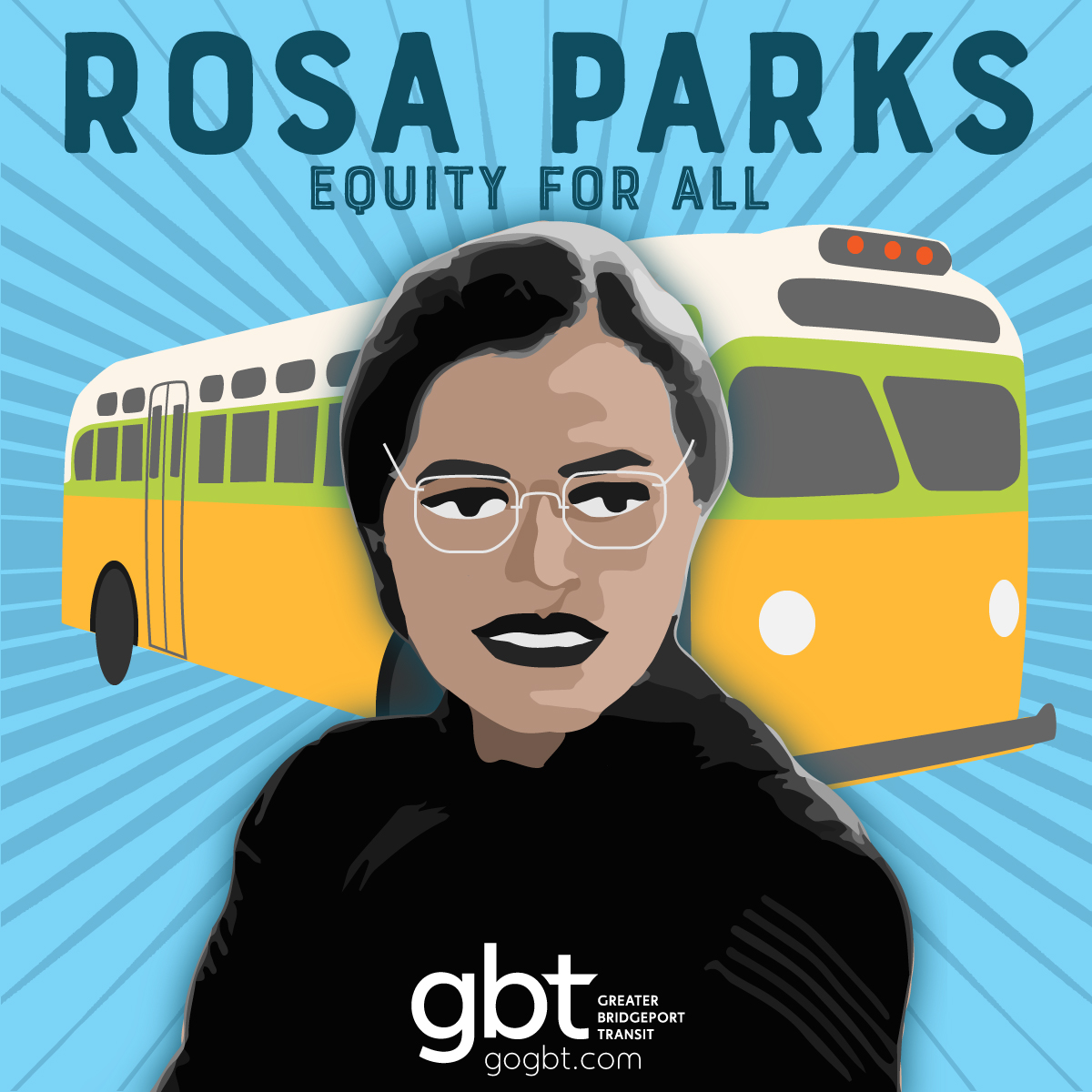Honoring Rosa Parks ?????????? Take A Seat For Transit Equity ● February 4, 2021
TOPICS: Rosa Parks • Listen In – Podcasts • Inside GBT We Care About Equity • What Do You Think About Transit Equity?

Rosa Parks
Equity for All
Each year, on February 4th, transit agencies and advocates around the country commemorate Transit Equity Day. This date was chosen because it is the birthday of the civil rights icon Rosa Parks, who refused to give up her seat on her afternoon bus commute on December 1, 1955, in Montgomery Alabama. Other riders of color that day complied with the segregated bus policy, but Parks refused, sparking a boycott that lasted for 381 days. Ultimately, the Supreme Court required the city of Montgomery to desegregate its bus system, opening the road for bus equity across the nation.
Rosa led the way and today we are continuously working to remove barriers, engage our communities, and ensure that high quality, safe and clean public transportation is available for everyone. It is critically important to millions of people in our country.
…the layout of rapid transit systems determines the accessibility of jobs.
―Dr. Martin Luther King, Jr., A Testament of Hope
At GBT, it is our mission to continually work to remove barriers to mobility for everyone who needs or would like to use public transportation.
Access for People with Disabilities and for Seniors
Through our Access service, we ensure that riders who cannot use the city bus because of a disability, have access to door-to-door service. The design of our buses has improved over the years and now includes low floor, no steps, access, wheelchair securement areas and special seating for seniors and riders with disabilities.
In Your Language
We produce outreach materials in nine languages that are common in the communities we serve, to ensure that language is not a barrier to accessing the bus. We have accessible phone numbers so that people with different language needs can get the information they need about bus service.
For the People, By the People
We utilize a robust community-driven process in which routes and services are designed with deep and meaningful input from the people who live in the communities we serve. This holistic approach enables us to be nimble and innovative with our resources to provide the best possible access to jobs, schools, medical centers, parks, churches, government centers, and many key destinations and community services in our region.
Unique Programs for Distinct Needs
We work with community organizations and leaders to design programs that meet special needs in the community – from programs for seniors, students, and riders with disabilities to mobility solutions for refugees, those reentering society, and others — to ensure that everyone has access to affordable transportation. Transportation is often a key element in helping people transition to the next best step in life. We take that seriously.

Cleaner Air, Healthier Neighborhoods
Zero-emission transportation promises a healthier future for our communities and our world. Over the last six months, we deployed Connecticut’s first two battery electric buses to reduce carbon emissions, improve air quality, and save money. This is a new beginning for GBT, and we look forward to leading the charge to a cleaner, healthier way to keep our communities moving.
Contributing to a better community through public transportation.
—GBT Mission Statement
Equity Every Day
We think about transit equity every day. Everyone is welcome on-board. We believe that a clean, reliable, predictable bus service is an important and essential part of our neighborhoods, our cities and towns, and our region.
Podcasts ● Listen In
Transit Equity and Social Justice
Public transportation plays a role in social equity. Listen in as CTDOT Bureau Chief of Public Transportation Rich Andreski chats with Doug Holcomb from Greater Bridgeport Transit and Tiffany Garcia from the Title VI Office at CTDOT about how Title VI and the Civil Rights Act of 1964 impacts transportation system planning. This episode covers the role transit plays in social justice and what Connecticut is doing to ensure equitable access to the transportation system.
GBT’s Civil Rights Programs
Doug Holcomb, GBT CEO explains GBT’s civil rights programs and efforts including equal opportunity employment, contracting opportunities for small businesses and minority owned businesses, service under the Americans with Disabilities Act, and Title VI of the Civil Rights Act of 1964 and its impact on transit.
Inside GBT ● We Care About Equity
“I believe that equity in public transportation, means a system that is inclusive of the entire population in the community it serves, riders and non-riders alike, both in the planning of the system and the day-to-day operation. A transportation system which provides service to all riders equally and is considerate of the impacts on the environment in which it operates, is an equitable one.”
―Steve DeMichele, GBT Director of Planning and Service Development
…giving even our most vulnerable citizens mobility choices to fully participate in their communities and to reach economic and educational opportunities.
―Richard Andreski, Bureau Chief of Public Transportation, Connecticut Department of Transportation
“Transit equity is about giving even our most vulnerable citizens mobility choices to fully participate in their communities and to reach economic and educational opportunities.”
―Richard Andreski, Bureau Chief of Public Transportation, Connecticut Department of Transportation
“To me Transit Equity encompasses all modes of transportation, including trains, cars, buses, bikes, scooters, even walking and each human being’s right to choose the options that best fit her life style. This can be achieved through display of respect for each mode and an understanding of their equal importance and acceptance of their choice to use it.”
―Christine Michaels, GBT Assistant to the CEO
The bus is a lifeline, it connects people to opportunities. The bus IS equity in action.
―Susan Rubinsky, Marketing Consultant to GBT
“I consider the bus to be one of the most essential services we need to invest in. Personally, GBT was a lifeline to me when I was growing up. I came from a family that did not have much financially. When I was in school, I used to take the bus almost every Saturday to the library in downtown Bridgeport to get books to read, to study, and to participate in weekend classes like drawing and painting. When I was a teen, I took the bus to and from my summer job on North Avenue. I saved all my money from that job and was able to buy my first (used) car which enabled me to commute to college in New Haven. Because of the bus, I was able to get access to learning, to a job, and eventually a car that got me to college. Without the bus to connect me to all those things, I literally would not have been able to get ahead in life. The bus is a lifeline, it connects people to opportunities. The bus IS equity in action.”
―Susan Rubinsky, Marketing Consultant to GBT
“The need for bus transit and the continued awareness of Transportation Equity in our region and across the country has been heightened since the pandemic. It has highlighted the need for mobility among our essential workers – we need to be able to continue to provide the services we all depend upon – regardless of race and/or economic status. Whether it’s our frontline healthcare workers or the people in our grocery stores, they rely on affordable access to a reliable bus transportation network.”
―Tom Gorman, GBT Deputy General Manager
 Alerts
Alerts




